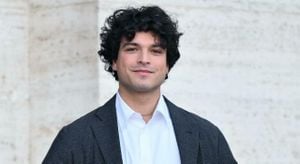Juana Rivas' struggle to protect her children from their father, Francesco Arcuri, has taken another turn as her eldest son, Gabriel Arcuri Rivas, now 18, publicly released distressing audio recordings of his pleas for help made years ago. Recorded when Gabriel was just 13, the audio captures the raw fear and desperation he felt at the hands of his father, who has been accused of domestic violence.
"Mami, por favor, tengo miedo, no quiero volver con papi. Me ha pegado y me ha cogido a Dani y le ha pegado en la cabeza muy fuerte..." ("Mommy, please, I’m scared, I don’t want to go back with daddy. He hit me and grabbed Dani and hit him hard on the head...") Gabriel's voice trembles as he recounts the harrowing experiences he and his younger brother, Daniel, endured living with Arcuri, who resides in Carloforte, Italy. Released through Rivas' legal team, the audio is part of evidence brought forth to both Italian and Spanish courts, illustrating their troubled past.
The emotional appeal was made during April 2019, but it has resurfaced against the backdrop of recent court decisions. A week prior to the audio's release, an Italian court awarded custody of Daniel, now 11, to Arcuri. Rivas is challenging this ruling, citing fears for her son’s safety. The court’s decision to grant custody has prompted another wave of scrutiny surrounding Arcuri’s behavior, which Rivas' legal representatives claim perpetuated violence and psychological abuse to isolate the children from their mother.
"Los niños tenían que llamar siempre a su madre a escondidas" ("The children always had to call their mother in secret"), stated Carlos Aránguez, Rivas’ attorney. He expressed shock at the Italian judiciary's decision to overlook the recordings and other evidence presented, aiming to demonstrate the children's suffering and the abusive environment under their father.
The difficulty of the situation escalates as Rivas recounts how, following the Italian court's orders, her youngest son might be forced back to Italy, undermining protective measures currently existing under Spanish law. The Spanish courts previously allowed Daniel to remain with his mother based on suspicions of abuse confirmed during medical examinations and witness testimonies. Rivas remains adamant her children have been subjected to abuse and names the narrative presented by Arcuri as severely biased.
During Gabriel's audio plea, he described physical confrontations. "Me cogió del brazo y me tiró contra la pared, y a Dani le hizo lo mismo... se hizo daño en la espalda y se quedó llorando en el suelo" ("He grasped my arm and threw me against the wall, and did the same to Dani... he hurt himself on the back and was left crying on the floor"). These declarations point to serious allegations of domestic abuse, corroborated by independent judicial evaluations and documented records of the children's injuries, which Rivas has submitted as evidence.
The implications of these findings have made the courts' decisions particularly contentious. Following the recent ruling, the privacy of minors has become accentuated as both the Italian and Spanish courts need to deliberate on the evidence providing support for Rivas’ claims. Experts have confirmed the authenticity of the audio recorded by Gabriel, declaring it free from manipulation, which is pivotal as parties continue to contest the veracity of the submitted evidence.
Despite the challenges posed by the Italian court systems, which have tended to favor Arcuri, Rivas and her legal team remain committed to seeking justice for the children. “There are plenty of proofs surrounding the maltreatment inflicted on them,” Aránguez emphasized. He reasserted the necessity for the courts to recognize the children's pleas, framing the consistent dismissals of Rivas’ claims as both disheartening and dangerous.
The latest developments also reveal the stark difference between the approaches taken by Italian and Spanish legal systems concerning custody and domestic abuse allegations. While Spanish authorities have placed protective measures to keep children from potentially dangerous environments, the Italian court's ruling appears to invite danger back to Daniel’s life.
Rivas warns of the serious repercussions of neglecting the voices of children who have expressed their fear, often feeling trapped and helpless. "Me tengo que ir, Mami; luego, si puedo, sigo," ("I have to go, Mommy; I’ll call back later if I can") the audio poignantly concludes, reflecting the children’s tumultuous reality.
This scenario is indicative of the larger issues embroiled within International Family Law, where the welfare of children often fluctuates under multiple judicial interpretations across borders. Rivas' advocacy not only reveals her personal struggle but also taps deep-seated issues surrounding how courts adjudicate domestic violence, particularly concerning the nature of gender-based violence and its effects on children.
While the legal battles continue, the outcry surrounding Daniel's impending return to Italy under Arcuri's guardianship remains fervent. Communities and advocates for child welfare closely monitor the failings of the judicial institutions, exemplifying urgency for change through Daniel's story, and serving as a catalyst for broader conversations on safeguarding children facing domestic abuse.
Rivas has called upon the courts to act decisively, arguing they have been handed sufficient evidence to preserve the safety and well-being of her children. With Gabriel's courageous act of sharing his recorded pleas for help, public attention has reignited concerns over parental custody laws, the influence of domestic violence on children, and the judicial measures required to mitigate risks for vulnerable individuals.



